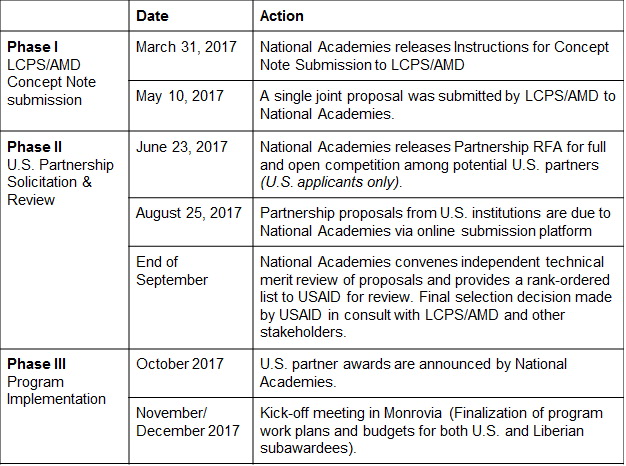|
Application Process
Eligibility
Only U.S. medical schools and universities are eligible to apply as prime sub-awardees. Consortia proposals, involving one or more eligible institutions, are also allowed. NGOs, hospitals, and independent research institutions are eligible to participate only as consortia partners.
Timeline and Application Process
The timeline of PEER/Liberia spans three phases as outlined below.
- In Phase I, AMD/LCPS were identified as the key partners by USAID. The National Academies were directed by USAID to provide a portion of the funds under the PEER/Liberia program as a subaward to LCPS and AMD. AMD/LCPS was asked to submit a joint Concept Note that outlines institutional needs, partnership, and training priorities for medical education. A full copy of the submitted Concept Note can be found here.
- In Phase II, an independent review panel will review U.S. partner proposals. Details provided in the AMD/LCPS Concept Note were used to create a PEER/Liberia U.S. Partnership Request for Applications (RFA). Proposals from U.S. institutions submitted in response to the PEER/Liberia U.S. Partnership RFA will be evaluated by an independent review panel convened by The National Academies. Selected U.S. partners are expected to be publicly announced in early October 2017.
- Program implementation will begin under Phase III. Implementation will begin with a partnership kick-off meeting to be scheduled sometime in the late fall of 2017. At this meeting both U.S. and Liberian partners will be asked to finalize a joint work plan and budget for the program. As the program proceeds, annual meetings will be coordinated by the National Academies and held in Monrovia to allow an annual review of annual work plans and project updates to key stakeholders.
 Available Funding SupportUSAID has budgeted a total of U.S. $4.0 million for subawards under the PEER/Liberia program for a period of up to 3.5 years. Of this total, U.S. $2.0 million is intended for subawards from the National Academies to LCPS and AMD for collaboration with the US PEER recipients. The remaining $2.0 million is expected to be competitively awarded by the National Academies to one or more U.S. partner institutions. Unless otherwise notified, all PEER/Liberia activities are expected to be completed by April 30, 2021, so that the subawards may be closed out before the end of USAID’s Cooperative Agreement with the National Academies on July 23, 2021. Budget proposals submitted by U.S. institutions should only account for activities to be managed by the U.S. institution (up to a total of $2.0 million for all U.S partners combined). More information on allowable and unallowable costs can be found in Section VIII (Budget Form and Justification). While U.S.-based training for Liberian faculty/students is allowable, it is anticipated that the majority of program activities would take place in Liberia. Final budgets for Liberian and U.S. partners will be developed as part of a work-planning process to commence in the fall of 2017. The National Academies will approve the final budget for all sub-awardees. Allocation of funds to all recipients (including Liberian and U.S. partners) is contingent upon meeting required standards to receive and properly manage U.S. Government funds. Submission InstructionsProposals must be submitted through the application system by 5:00 PM U.S. Eastern Daylight Time on August 25, 2017. U.S. applicants should not reach out to AMD or LCPS directly during the RFA process, as this would be in violation of USAID’s procurement rules. U.S. applicants should direct all questions or comments on the PEER/Liberia program or RFA to the U.S. National Academies peer@nas.edu. . Supplemental materials are provided to help with completing your PEER/Liberia application. About the Application TemplateThe application includes the following sections: - U.S. Partner program description
- Background and experience
- Activities to strengthen medical training and building subspecialty medical capacity in Liberia under the subsections of infectious disease, family medicine, and ophthalmology
- Activities to improve clinical research capacity
- Activities to increase access to specialty care for Ebola survivors and the broader Liberian population
- Activities to promote institutional administrative capacity building
- Draft budget form and justification
- Key personnel
- Letters of support - from an official at the applicant's institution who is legally authorized to make commitments on the institutions behalf. These letters must be signed and written on official institutional letterhead and must include the following elements:
- Confirmation that the institution supports the participation of its staff in the proposed project and would be willing to receive and administer any grant funds awarded;
- A brief description of the institution’s structures and practices for project management and financial oversight; and
- A brief description of resources that the institution would be making available (if any) to facilitate the project, whether in cash or in kind, for example, by paying the salary of any staff members involved for the time they work on the program, providing substitute instructors to cover their other duties so they are free to work on the program, or providing laboratory or office space, access to equipment, or office support staff.
| 



